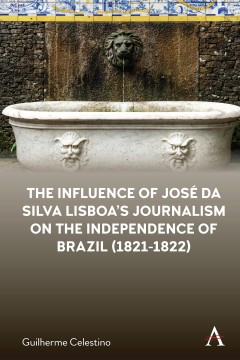The Influence of José da Silva Lisboa’s Journalism on the Independence of Brazil (1821-1822)
By Guilherme Celestino
Other Formats Available:
E-Book- About This Book
- Reviews
- Author Information
- Series
- Table of Contents
- Links
- Podcasts
About This Book
This book analyses the impact of the publications written by the economist, jurist, administrator and historian José da Silva Lisboa, the future Viscount of Cairu, from 1821 to 1822, on the events that led to the independence of Brazil in 1822. It reassesses the many interpretations of his role throughout the period, repositioning him among those who are part of the broad reformist Catholic Enlightenment.
In an original account of his career and a new interpretation of his role in helping create an appropriate environment for ideas to be discussed during the post constitutional period that followed the Liberal Revolution in 1820 in Portugal, the book brings to light the extent to which his ideas were influenced by the Enlightenment, and how these ideas influenced public opinion in the transition away from the Reino Unido with Portugal, between 1815 and 1822, towards an independent Brazilian empire under Dom Pedro.
The book argues that while a supporter of Brazilian autonomy, a fierce critic of the Cortes of Lisbon, and an important figure in the events that unfolded after the departure of Dom João VI from Rio de Janeiro in 1821, he did not openly embrace the independence from the United Kingdom with Portugal and would instead work towards a solution that would encompass Brazil’s autonomy within a Portuguese empire, which did not take place.
Reviews
By inquiring into José da Silva Lisboa’s role in the process of Independence, Guilherme Celestino seeks to re-evaluate the conventional position he has occupied for such a long time in Brazilian historiography – a conservative or a reactionary – in order to give a new interpretation of the role played by this man. And so, a convinced monarchist emerges, defender of the House of Braganza, who was guided by the Portuguese Enlightenment preaching the renewal of institutions through gradual reform. A book destined to be a reference for studies on the Independence period and on Silva Lisboa’s own thinking’ — Lucia Bastos P. Neves, Professor of Modern History at Universidade do Estado do Rio de Janeiro, Brazil
The histories of Ibero-American independences have been too attached to analyses tied to the Anglo-Saxon paradigm of the “era of revolutions.” Celestino’s book is in this sense a breath of fresh air, not only because it suggests alternatives to the interpretative canon but also because it opens new avenues for thinking about and articulating concepts and facts that have been conventionally contested. An original, daring and undoubtedly stimulating work’ — Isabel Corrêa da Silva, Research Fellow at Instituto Ciências Sociais, Universidade de Lisboa, Portugal.
Guilherme Celestino’s exquisite work is fundamental for us to understand several crossroads of Brazilian society, both at the beginning of the Empire and today. Silva Lisboa is more present than ever, in many representations and practices of today. Guilherme escapes the spectrum of pragmatic and conservative evocations of the Viscount of Cairu, to observe him almost side by side, as he invited the economist to walk in the garden of the modern approach and highly qualified research, a work developed with great responsibility.’ — Carlos de Faria Jr., Lecturer of Economic History and Economic Formation of Brazil, Universidade Federal de Juiz de Fora, Brazil
Author Information
Guilherme Celestino is a historian of political ideas with a PhD in Portuguese and Brazilian studies from King’s College London and also a former visiting fellow at Instituto de Ciências Sociais, Universidade de Lisboa.
Series
Anthem Brazilian Studies
Table of Contents
Acknowledgements; Foreword; José da Silva Lisboa and the Brazilian Independence Revisited: Introduction and Argument; Chapter One Brazil and Silva Lisboa in Context; Chapter Two Constitutionalism before the Fico 1821–1822; Chapter Three Reclamação Do Brasil: Paving the Way for Independence without Supporting It ; Chapter Four The Pamphlets Which Failed to Keep History under Control; Conclusion: Ideas that Shaped Brazilian History; Bibliography; Index
Links
Stay Updated
Information
Latest Tweets



